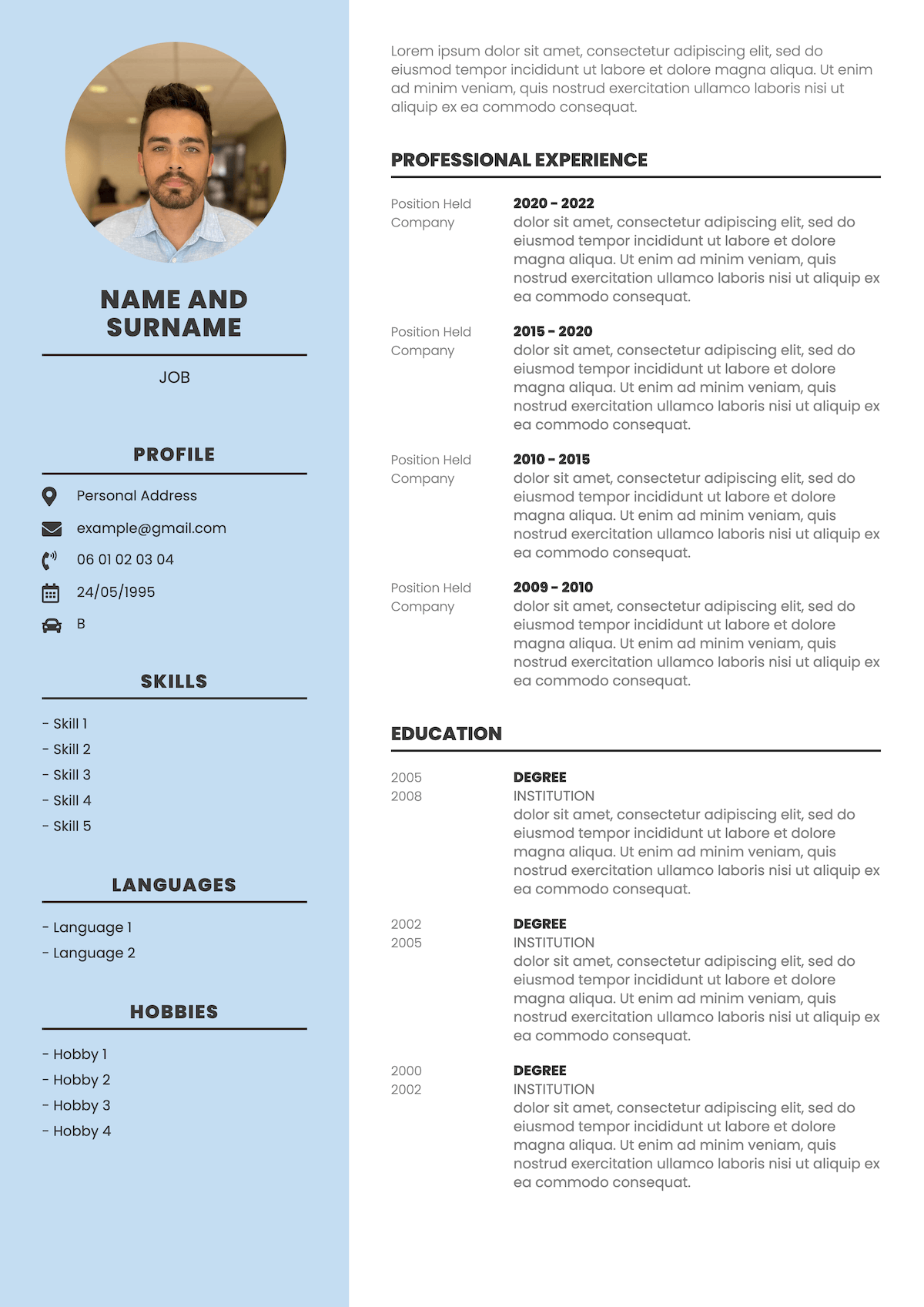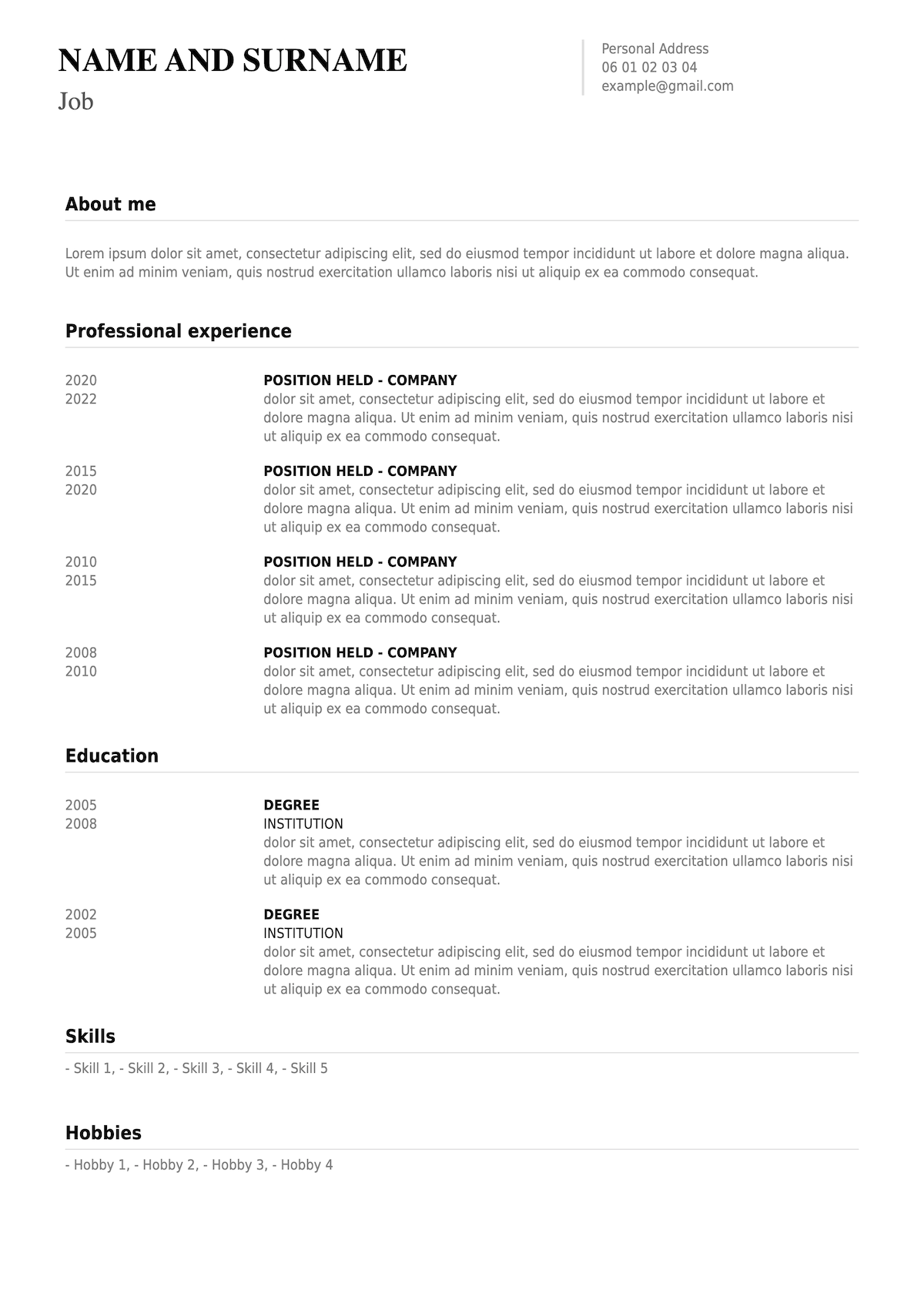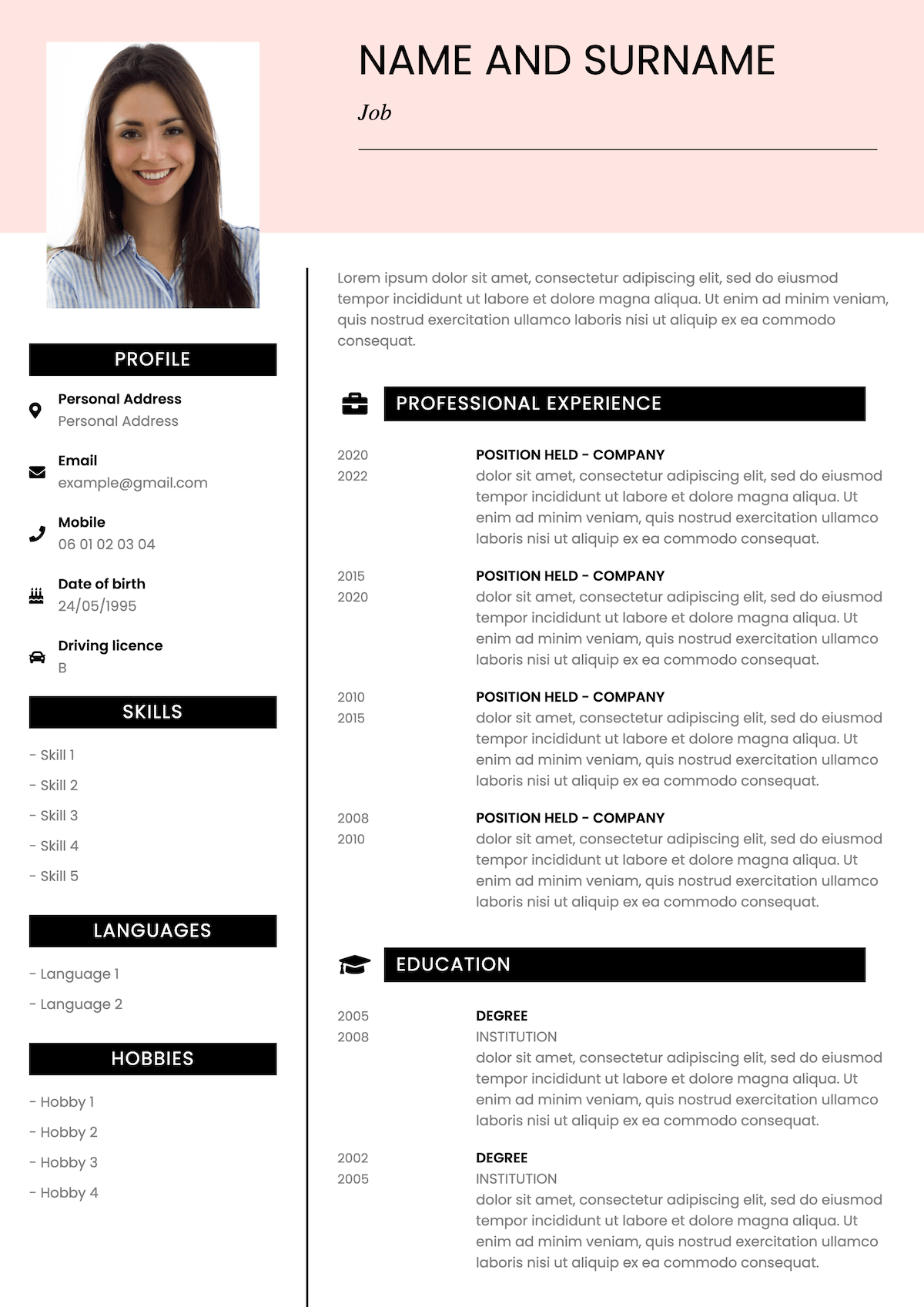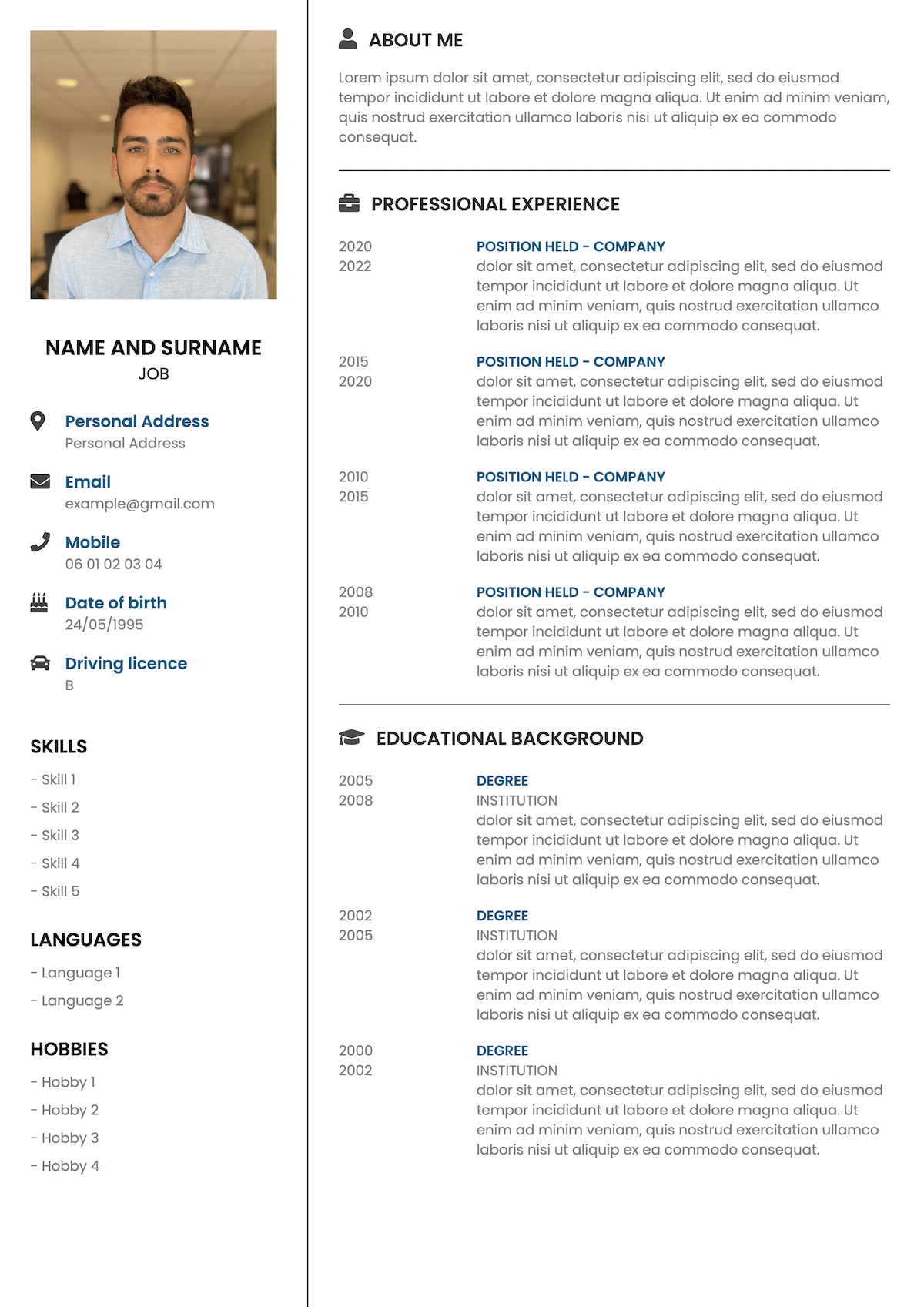Police CV
Working in the police force is a career that demands discipline, dedication, and a strong sense of responsibility. A well-written police CV is essential to highlight the right skills, training, and experience needed for this role. It should clearly show an understanding of law enforcement, public safety, and teamwork. Employers look for candidates who demonstrate strong communication abilities, problem-solving skills, and a commitment to serving the community. Whether applying to be an officer or advancing in the field, a solid police CV can make a real difference in standing out during the recruitment process.
Dedicated and disciplined police officer with over 5 years of experience in law enforcement. Strong background in crime prevention, public safety, and community engagement. Excellent ability to remain calm under pressure and make quick, sound decisions. Known for teamwork, integrity, and effective communication.
Professional Experience
Police Constable
Greater Manchester Police, UK
[Date]
- Responded to emergency calls and carried out daily patrols
- Conducted investigations and prepared reports
- Assisted in arrests, searches, and interrogations
- Promoted community relationships through local events
Security Officer
Sentinel Security Services, Manchester, UK
[Date]
- Monitored premises to prevent theft and unauthorized access
- Cooperated with local police when incidents occurred
- Performed routine security checks and wrote daily activity logs
Education
Diploma in Policing
College of Policing, UK
[Year of Graduation]
Certificate in Criminal Law
Open University, UK
[Year of Certification]
Want to see more CV templates?
The different parts of the Police CV
A Police CV must be well-structured, clear, and professional to highlight the candidate’s qualifications and experience. Recruiters focus on essential elements like law enforcement skills, physical endurance, and crisis management abilities. A strong CV should effectively showcase a candidate’s dedication to public safety and ability to handle various situations under pressure. The document should include key sections such as About, Skills, Languages, Interests, Professional Experience, and Education. Each section provides crucial details that help recruiters assess whether the candidate meets the standards required for a career in the Police. A strong and detailed CV increases recruitment chances.
The about section
The “About” section provides a brief but impactful summary of the candidate’s professional background and career objectives. It should focus on experience, skills, and motivation for joining or advancing in the Police. A well-written introduction captures the recruiter’s attention and immediately showcases dedication, professionalism, and ability to handle security responsibilities. This section should be clear, concise, and free of unnecessary details. The goal is to highlight key strengths in law enforcement and demonstrate how past experiences align with the role. A strong opening statement helps create a positive first impression and encourages further review of the CV.
Example:
“Motivated and reliable police professional with strong experience in public safety, crime prevention, and law enforcement procedures. Known for excellent judgment, attention to detail, and the ability to handle high-pressure situations with calm and efficiency. Committed to building trust within communities and upholding the values of integrity, respect, and fairness. Adaptable, physically fit, and always ready to take initiative in critical situations.”
The skills section
The skills section is crucial because it highlights the candidate’s core abilities needed for law enforcement. It should include both technical skills like handling firearms, conducting investigations, and enforcing laws, as well as soft skills like teamwork, leadership, and communication. Recruiters look for candidates with strong physical fitness, problem-solving abilities, and decision-making skills under pressure. The key is to present skills that demonstrate readiness for demanding Police tasks. A well-organized skills section improves CV readability and ensures that important qualifications are immediately visible to hiring managers.
Example:
- Law enforcement procedures: Strong knowledge of legal frameworks and crime prevention strategies.
- Crisis management: Ability to make fast, strategic decisions under pressure.
- Physical endurance: Excellent fitness level, trained in self-defense and high-intensity operations.
- Communication skills: Ability to interact professionally with citizens and colleagues.
- Investigation techniques: Skilled in evidence collection and suspect interrogation.
- Teamwork and leadership: Experienced in working with teams and leading tactical operations.
The languages section
Languages play an important role in law enforcement, especially in multicultural areas or international missions. Listing languages in a Police CV shows adaptability and the ability to communicate with diverse communities and foreign officials. Fluency in multiple languages can be an advantage for roles involving border control, international security cooperation, or diplomatic protection. Recruiters favor candidates who can speak more than one language fluently, as this improves efficiency during investigations and crisis situations. A well-presented languages section helps emphasize a candidate’s communication abilities and cultural awareness in law enforcement contexts.
Example:
- English: Fluent – Strong command in speaking, reading, and writing for official reports.
- French: Native – Excellent ability to communicate in professional and operational settings.
- Spanish: Intermediate – Capable of handling basic conversations and law enforcement interactions.
The interests section
The interests section is not mandatory but can add a personal touch to a CV and showcase additional qualities relevant to the role. It allows recruiters to see a candidate’s personality, motivation, and dedication to personal growth. Activities that demonstrate discipline, physical endurance, and problem-solving skills are particularly valuable. Including interests related to fitness, self-defense, community service, or tactical training can strengthen a Police application. This section can also highlight a candidate’s team spirit and commitment to security-related fields, making them a more attractive candidate for the role.
Example:
- Martial arts and self-defense: Trained in Judo for five years to improve reflexes and discipline.
- Outdoor survival skills: Passion for camping and survival training, useful for field operations.
- Volunteering in community safety programs: Active participation in public security awareness campaigns.
- Physical fitness training: Regular workouts to maintain strength and endurance for active duty.
The professional experience section
The professional experience section is the most important part of a Police CV. It provides details about previous jobs in law enforcement, security, or military service. Recruiters focus on responsibilities, achievements, and real-life experiences that demonstrate expertise in crime prevention, investigations, or emergency response. Each job should be listed with clear descriptions of duties and key successes. It is essential to use action verbs and highlight contributions to show leadership and effectiveness in past roles. A well-detailed professional experience section makes a CV more convincing and credible.
Example:
Border Patrol Agent – UK Border Force, Dover, UK
March 2019 – February 2022
- Controlled and inspected incoming vehicles and passengers at border points
- Detected and prevented illegal immigration and smuggling activities
- Worked closely with national police and intelligence teams
- Maintained accurate records and completed detailed incident reports
The education section
The education section provides details on academic qualifications and law enforcement training. A strong background in criminal law, security, or military studies is highly valued in the Police. Training programs, certifications, and specialized courses in police work should be listed to demonstrate preparedness for the role. Recruiters look for candidates who have completed official training in tactical operations, legal procedures, and emergency response. Including relevant coursework and achievements during training can make a CV stand out. The education section proves a candidate’s competence and commitment to professional development.
Example:
Police Officer Initial Training Programme (PCDA)
Metropolitan Police Service, London
2018 – 2019
How do I write a strong “About” section for a Police CV?
The “About” section in a Police CV should be concise, impactful, and highlight key strengths. It must showcase experience, skills, and motivation for a law enforcement career. A strong introduction includes years of experience, expertise in security, and dedication to public safety. Use clear, confident language to express professionalism and commitment. Avoid vague statements and focus on specific qualities like crisis management, teamwork, and leadership. This section should immediately capture attention and make recruiters interested in reading further.
What is the best way to list my training and certifications?
The training and certifications section should be structured for clarity and professionalism. List each certification with the official title, issuing institution, and year of completion. Highlight relevant law enforcement training such as firearms handling, criminal law, emergency response, and tactical operations. If applicable, mention specialized courses in counterterrorism, crowd control, or forensic investigation. Use bullet points for readability and avoid unnecessary details. A well-organized training section strengthens the CV by proving formal qualifications and continuous professional development.
How should I describe my law enforcement experience effectively?
To describe law enforcement experience effectively, focus on specific responsibilities, key achievements, and measurable impact. Use action verbs like patrolled, investigated, enforced, and secured to describe duties. Highlight successful operations, crime prevention efforts, or leadership roles. Mention collaborations with other agencies, crisis situations handled, and any commendations received. Keep descriptions concise but informative, showing how past roles contribute to strong law enforcement expertise. Using a structured format makes the experience stand out.
What font and style should I use for a professional Police CV?
A professional Police CV should use a clean, readable font like Arial, Calibri, or Times New Roman in size 11 or 12. Avoid decorative or overly stylized fonts that reduce readability. Use bold headings for section titles and bullet points for easy scanning. Keep spacing consistent to ensure a structured, professional look. A one-page or two-page format is ideal for readability. Avoid excessive colors—black text on a white background is the best choice. A well-formatted CV demonstrates professionalism and attention to detail, making it easier for recruiters to assess qualifications.
Create your CV now
Choose a template CV and create your own online






